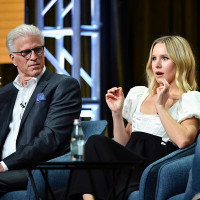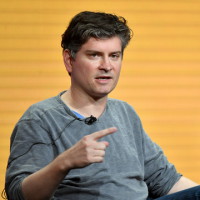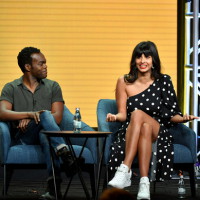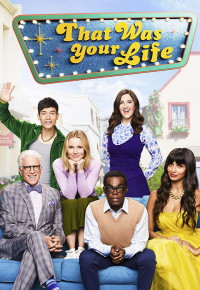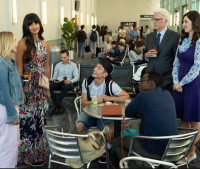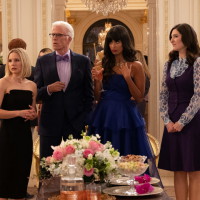NBC THE GOOD PLACE Final Season 4 Q&A w/ Cast & Creator Michael Schur
Maj Canton - September 26, 2019
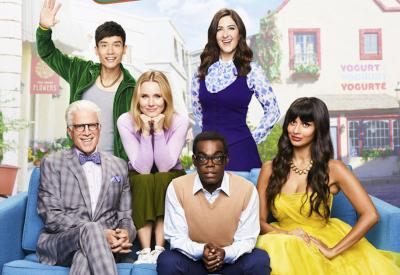
On Thursday, September 26, 2019 at 9pm ET/PT, NBC premieres the fourth and final season THE GOOD PLACE, one of television's most memorable comedies. On ending the series Michael Schur, creator and executive producer said, "given the ideas we wanted to explore, and the pace at which we wanted to present those ideas, I began to feel like four seasons – just over 50 episodes – was the right lifespan. At times over the past few years we've been tempted to go beyond four seasons, but mostly because making this show is a rare, creatively fulfilling joy, and at the end of the day, we don't want to tread water just because the water is so warm and pleasant. As such, the upcoming fourth season will be our last."
In the season premiere episode, "A Girl From Arizona," with Eleanor assuming the role of the architect, the group adapts to the challenges facing them when four test subjects inhabit a new neighborhood under their supervision.
One week earlier -- on September 19, 2019 -- NBC aired "The Paley Center Salutes The Good Place" special that comprised the best moments, hilarity, and wit from the show's first three seasons, plus interviews with the show's cat and rarely seen behind-the-scenes footage. Watch the special here.
Recently TV Tango attended a press event, where NBC presented a panel that included cast Kristen Bell, D'Arcy Carden, Ted Danson, William Jackson Harper, Manny Jacinto, & Jameela Jamil, plus series creator & Executive Producer Michael Schur. Here are a few highlights (edited for clarity and readability) from that panel.
|
|
|
Ted Danson and Kristen Bell |
Question: For Ted and Kristen, how did you receive the news that the show was ending? Kristen Bell: I got a call from Mike Schur when I was driving in the car, and I had a sixth sense about what he was about to say because he said, "Hey, we need to talk." And I said, "Before you say anything else, you have to promise me that you'll write me a show after this one, and that's the only way I'm not going to hang up on you." And he said, "Okay." So I think it's legal because you guys are writing it down. And then, he said, "I have done a lot of thinking about it. Haven't made this decision haphazardly, but I have found an ending that this story needs," and I have always made it my mission to trust Mike, and it has never backfired. Ted Danson: I think we were all a little surprised and full of respect, because we've told the story from day one the way we wanted to, and to sit there and pad a story that is a very specific message and a morality tale, and all of a sudden have the gang trapped in a snowstorm singing musicals would have been weird. So I am grateful that it ended with as much integrity as it started. |
|
|
|
Manny Jacinto as Jason in THE GOOD PLACE |
Question: Why didn't they wipe Jason's mind since Jason tends to not be very good at figuring out which end of the secret is a secret? Manny Jacinto: I think Jason has a very goldfish memory. I think that's probably the biggest reason why we would have to worry about him. You can tell him your deepest, darkest secret, and then he would probably forget it 10 seconds later. And I'm sure there have been instances when he had to have his hand slapped or had to be disciplined or kind of taken away from that situation every once in a while. But for the most part, I think he's growing and learning. |
|
|
|
Executive Producer Michael Schur |
Question: Did having a much shorter episode order help keep the episodes sharper and funnier, or were there more stories you wanted to tell that you didn't get a chance to? Michael Schur: I think it helped a great deal. From the moment I pitched the show to Universal and to NBC, baked into it was we're going to move really fast, and there had been a number of shows in the recent past that had, I think, benefitted from shorter orders and from a lot of sort of narrative propulsion. And I remember thinking, if I'm going to execute this show the way that I think it should be executed, it wouldn't be a 22 episode, 24 episode a year show. It isn't like we knew that in the seventh episode of the first season Eleanor was going to confess and blow up the entire premise that we started with. You can't do things like that and stick to them if you are doing what network TV shows have traditionally done, which is try to stick around as long as possible. I think it was exactly the right number of episodes per season. I think it ended up being the right number of seasons. We got exactly the story that we wanted to tell in under the wire, and I'm very grateful to both the studio and the network that every time I pitched an aspect of the show that was counterintuitive or nontraditional or whatever you want to call it, they rolled with it every time, and it really, I think, made the difference. |
|
|
|
William Jackson Harper & Jameela Jamil |
Question: What's something you're going to take from this experience? William Jackson Harper: The cash. (Laughter.) I mean, that's not lying. First off, I feel like Ted and Kristen set a tone. There's no better artists to lead your show. And I see what it is to live in a place of gratitude for the chances that we've been given. So I think coming away from the show, I can only hope, no matter where I am on the call sheet going forward, that I can promote the same atmosphere that these two so generously gave us. I feel like there's no people on this planet that are as generous and professional and talented as these two. So I'm going to take that away more than anything else. Jameela Jamil: This was my first ever audition, so I didn't know what to expect of a TV show, full stop. I hadn't been an actor, and I got to learn from the most talented people I've ever met, and I got to be on a show with Mike, so I think one of the things I learned is never make a show without Mike. So I'm probably here to retire. I'm retiring today. (Laughter.) |
|
Jameela Jamil (continued): Because I can't imagine finding an environment where I feel so safe, so respected, so part of something real, and it exists on-screen and off-screen, the environment that you see, the chemistry that you see. That exists amongst 250 people on our set. It's a lot of people who make our show, and all around it's the most extraordinary experience. Yeah. Retiring. (Laughter.) Also, I can't even count the amount of times I've seen Ted literally skip around the set of THE GOOD PLACE, the neighborhood, and say, "Aren't we so lucky that we get to do this for a living?" And it's so cool to see someone who's been doing this for a short while and still find such enthusiasm for it, and that was super infectious and something that I will be mindful to always remind myself and others of, because people get jaded and complacent so fast. D'Arcy Carden: I don't think I can say it better than Will said it. We got the best possible leaders. And I think just seeing that it is possible to make something that you're so proud of and that people seem to like and the on-set environment can be the way it is because of Ted and Kristen and because of Michael Schur, and then also because of the heads of every department on our entire crew are as good as these guys. You just have no idea how good it can be until you experience it, and then you kind of don't want to do anything less. Manny Jacinto: Just to touch on what D'Arcy and Jameela and Will said, I think it goes with not only your demeanor on set but also your demeanor off set. They lead great lives outside of just this whole acting world, and it's something to aspire to and to reach for, whether they be involved with their families or humanitarian work. It makes me question how useful of a human being I actually am. We'll get there. We'll see. |
|
|
|
|
|
Question: Michael, could describe whether or not the show is moral or edgy? Michael Schur: I pitched the show as an investigation of what it meant to be a good person, and I found, over the course of working on it with the writers and the actors and the entire crew, that that's even a more complicated question than I think I thought it was. I thought at the beginning that the show could, if given the chance, describe what it meant to be a good person. That was my hope. It meant here's what a good person looks like in the world. Here's how a person can feel like he or she led a good life. At the end of the day, I think that objective kind of shifted a little bit, because what we found, as we discussed it and wrote it and executed it, is that some very, very smart people over the last, say, 3,000 years have had a lot of very different opinions about that question. What the mission of the show then became was to give you a bunch of options. You can be a good person this way. You can try to be a good person this way, or you can try to be a good person this way, and what we ended up saying was we're going to present a bunch of options, and by the way, there are plenty more that we didn't describe, but what's important is that you try one of them. My internal shift over the course of making the show was the newfound belief that the important thing wasn't actually being good. The important thing was that you're trying, because it feels like a huge part of the problem, from my point of view, is that not enough people are just trying, and trying means failing. Everybody fails all the time, even people with the best of intensions will fail, and it doesn't matter whether you follow this theory or that theory or this belief or whatever. You're going to fail a lot. We all fail all the time at this. And so I guess this is a long winded way of saying at the beginning I pitched it as what it means to be a good person, and at the end, I would describe this as a show that makes the argument that we all ought to try harder than we are. And as long as you're trying, you're on the right path. It's also edgy. |
|
|
|
D'Arcy Carden |
Question: Who would most likely make you guys break character and laugh? Ted Danson: Manny. D'Arcy Carden: Manny makes us break a lot. William Jackson Harper: Manny breaks everybody. |
|
Kristen Bell: He makes some of the most out of the box decisions I have ever seen an actor come up with. Because you read his character and he's funny when he comes out of the writers' room and he's on the page. And then he gets put through Manny's filter and you have to be so strong if you are in a scene with him because you will not know his read. You can think, oh, I know how he's going to do it because I know the character of Jason. No. It will never be the case. Jameela Jamil: I could do it no justice, but there was a moment that haunts me to this day as to the hardest I've ever found it to keep a straight face, which was when Manny was trying an Australia accent. And in doing it, this was his Australian accent. (In a somewhat Italian accent) "We gonna put a the shrimp on a the barbie."(Laughter.) Which is truly just the most bizarre decision and one of the funniest things I've ever seen. Also, in the bloopers reel, when he's pretending to be a kangaroo and he goes what's the sound you make? |
|
|
|
|
|
Question: Does anyone have a particular episode that sort of stands out for you as you're looking back over all these seasons? Kristen Bell: When we expanded the world and went down to Earth as the Soul Squad because we had realized that our fates were sealed and we were not surviving. We were never going to the good place and what is the point of existing. And we thought, oh, maybe other people are. Let's go try to help the people we love make better decisions, just influence them. And I thought that was just a beautiful, beautiful thing to say in an episode. To go back and find people that have maybe even been turbulent in your life. Like, Eleanor's mom has not been great, but through what she learned through these emotional connections, was, oh, my mom probably had a rough time too. I'm going to go and be a standup person for her and see if I can get her into the good place. I just thought that was a really beautiful sentiment. |
|
|
|
(L-R): Kristen Bell as Eleanor, Ted Danson as Michael, Jameela Jamil as Tahani, and D'Arcy Carden as Janet in "A Girl from Arizona" episode of THE GOOD PLACE |
Question: Michael, THE GOOD PLACE is an intellectually challenging show, do you think more shows will follow this trend? Michael Schur: I think that the idea that networks don't make challenging TV shows is a disappearing notion. When I was conceiving of this show, THE LAST MAN ON EARTH was on Fox, which I loved. And I was like, well, if Fox can make that show, I can make this show. That pilot has essentially just Will Forte in it milling around, doing insane things and there's no dialogue for 15 minutes. That was as bold an idea as anything that was on any premium show or streaming service or whatever. When I pitched this show to them, I pitched them the entire first season. They didn't flinch. They liked the idea. They thought it was good. They saw the potential for it. And we made every single episode exactly the way that we wanted to make it. |
|
|
|
Michael Schur |
Question: Did you always know that the point system was not going to work? Michael Schur: It's a sort of microcosm of the whole history of the show in terms of its development for me, because it started with, what if the system is purely mathematical and absolute? No one could ever dispute it. It's incredibly problematic to just say that the moral worth of every action has a point value and there's a total and it's a video game. Of course it's a terrible system. That is my personal experience of any kind of moral theory or religious theory or anything that you might follow as one system of rules to guide all of your actions. Even the ones that sound really good, you stress test them long enough and you're going to find out that there's a lot of problems with them. |
|
|
|
Ted Danson as Michael and Kristen Bell as Eleanor in "The Book of Dougs" episode of THE GOOD PLACE |
Question: Ted and Kristen, how much did you know about all the changes and surprises your characters would go through? Kristen Bell: Both Ted and I were fully up to speed before signing on, and that was because Mike is a consummate collaborator and he said, "I'm going to do something funky with this, and I want you to know the whole scope of what you're signing up for before you say yes." And so we knew that the end of the first season would be this reveal that we were in the bad place. But beyond that, we didn't know anything. So we were all neutralized at the end of the first season. And, full disclosure, all of us, as much as we trust Mike and everyone, we were all, "Where are they going to go with this? This is crazy." And the writers and Mike would come down to set and they'd whisper something in our ear and it would get us so excited. That is incredibly empowering to work in that kind of a community. Mike sets the tone that makes everything work in this joyful manner, because everyone feels included. And you might not know what the next step is going to be, but there is such a love and a trust behind it that you just don't care. You're happy to be part of this family. |
|
Ted Danson: Yeah, yeah, yeah, absolutely. It's just a delight. And the second season was like carte blanche. You could do no wrong, because you were a demon and it was so much fun. The thing that I think makes everybody in this cast show up, after four years -- you can have personalities. You can have life. Our focus when we drive through the gates is to live up to the material. I think that was our guiding principle, really. What's different about the ending of this show is we knew it was coming and we knew it was right to end. We all got to be part of the going, "Here. Here's our gift." I hope that doesn't sound pompous. But here's the gift of this show and we're all part of it and we all were part of the decision and here. This is us and ours and please enjoy. You don't usually get that kind of opportunity -- woof. |
|
|
|

